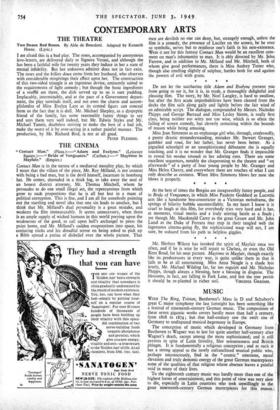THE CINEMA
"Contact Man." (Plaza.)—" Adam and Evelyne." (Leicester Square.)—" Bride of Vengeance." (Carlton.)—" Maytime in Mayfair." (Empire.)
Contact Man is in the nature of a mediaeval morality play, by which I mean that the villain of the piece, Mr. Ray Milland, is not content with being a bad man, but is the devil himself, incarnate in homburg hat. He comes, shrouded in a thick fog, to take away the soul of an honest district attorney, Mr. Thomas Mitchell, whom he persuades to do one small illegal act, the repercussions from which grow to such proportions that he is all but lost in a maze of political corruption. This is fine, and I am all for somebody pointing out the startling and novel idea that one sin leads to another, but I think that Mr. Milland's dual personality is a great mistake, and weakens the film immeasurably. It seems unnecessary, when there is an ample supply of wicked humans in this world preying upon the weaknesses of the good, to call upon hell's archangel to press the point home, and Mr. Milland's sudden evaporations into space, his conjuring tricks and his dreadful terror on being asked to pick up a Bible spread a patina of disbelief over the whole picture. That men are devilish no one can deny, but, strangely enough, unless the film is a comedy, the presence of Lucifer on the screen, be he ever so symbolic, serves but to reinforce one's faith in his non-existence. Were it not for this fantasy Contact Man would be an excellent com- ment on man's inhumanity to man. It is ably directed by Mr. John Farrow, and in addition to Mr. Milland and Mr. Mitchell, both of whom give good performances, there is Miss Audrey Totter who, though also smelling slightly of sulphur, battles both for and against the powers of evil with gusto.
Do not let the saccharine title Adam and Evelyne prevent you from going to see it, for it is, in truth, a thoroughly delightful and pleasing film. The story, by Mr. Noel Langley, is hard to swallow, but after the first acute improbabilities have been cleared from the decks the film sails along gaily and lightly before the fair wind of an admirable script. The dialogue, compounded by Messrs. Nicholas Phipps and George Barraud and Miss Lesley Storm, is really first class, being neither too witty nor too wise, which is so often the failing of screen comedy, but cleverly remaining within the bounds of reason while being amusing.
Miss Jean Simmons as an orphanage girl who, through, confessedly, a pretty drastic misunderstanding, mistakes Mr. Stewart Granger, gambler and roué, for her father, has never been better. As a pigtailed schoolgirl or an unsophisticated debutante she is equally touching, and it is no wonder that Mr. Granger finds it impossible to reveal his modus vivendi to hex adoring eyes. There are some excellent sequences, notably the chaperoning to the theatre and "on afterwards" of a party of four young people by Mr. Granger and Miss Helen Cherry, and everywhere there are touches of what I can only describe as cosiness. When Miss Simmons blows her nose she blows it properly.
At the best of times the Borgias are inexpressibly funny people, and in Bride of Vengeance, in which Miss Paulette Goddard as Lucretia acts like a handsome boa-constrictor in a Victorian melodrama, the springs of hilarity bubble uncontrollably. In my heart I know it is cruel to laugh at this film, for everybody tries very hard and it has, at moments, visual merits and a truly stirring battle as a finale ; yet though Mr. Macdonald Carey as the great Cesare and Mr. John Lund as the Duke of Ferrara may trap in their tangled web the ingenuous cinema-going fly, the sophisticated wasp will not, I am sure, be seduced from his path to helpless giggles.
Mr. Herbert Wilcox has invoked the spirit of, Mayfair once too often, and if he is wise he will repair to Chelsea, or even the Old Kent Road, for his next picture. Maytime in Mayfair, though exactly like its predecessors in every way, is quite unlike them in that it fails to be at all entertaining. Miss Anna Neagle is a shade less lovely, Mr. Michael Wilding far, far too roguish and Mr. Nicholas Phipps, though always a blessing, here a blessing in disguise. The blossoms, in fact, are falling in Park Lane, and lest the tree perish it should be re-planted in richer soil. VIRGINIA GRAHAM.


































 Previous page
Previous page